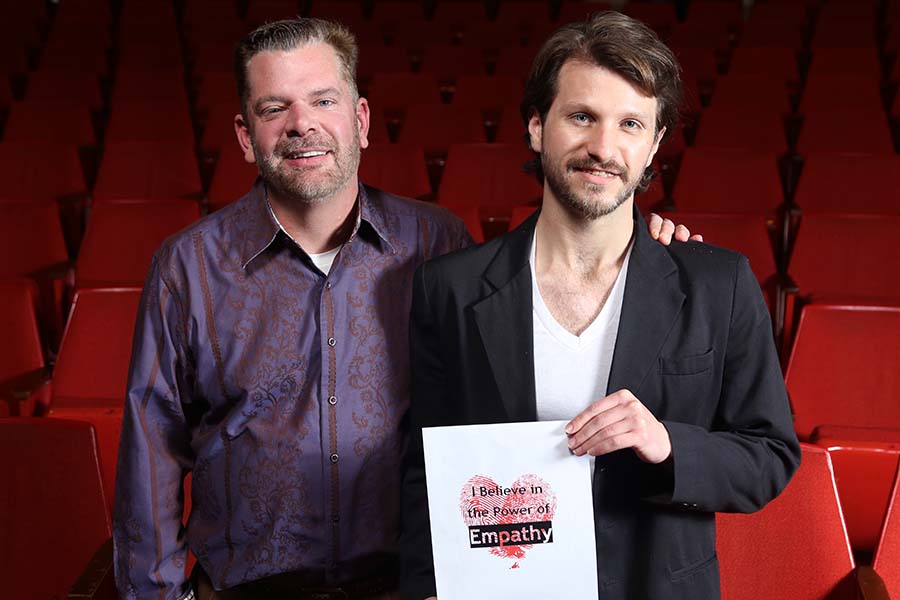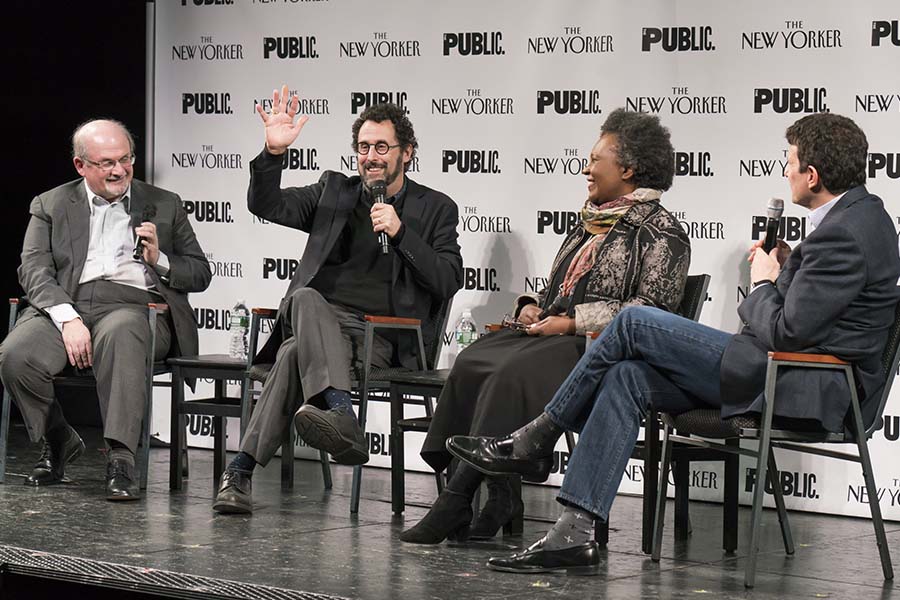When theatremakers and activists were getting the Ghostlight Project off its feet, someone joked to director Jenny Koons that there are two things theatres have that people need right now: a place to gather and bathrooms.
In all seriousness, says the New York-based Koons, a member of Ghostlight’s steering committee, “This is a moment when community groups don’t always have resources for those two things.”
Something theatres have always done well is bring people together. Traditionally people gather to see a show and maybe stick around after for a talkback, but increasingly, and especially since the 2016 presidential election and the inauguration of Donald J. Trump, theatres and theatre people have been looking for ways to bring those people together to make a statement, start a discussion, or support a cause independent of a particular theatrical production, with some initiatives being more openly political than others.
“There’s a hunger for discussion,” says Oskar Eustis, artistic director of the Public Theater in New York City. When the Public and The New Yorker announced their new series “Public Forum: A Well-Ordered Nation” had been added to the spring Public Forum lineup, the four-part series sold out in 90 minutes.
“The need that we tapped into the second we announced this is huge—that I think our audiences are hungry for a place to chew on what just happened on Nov. 8 and what does it mean,” Eustis says. The series is billed as bringing “artists, thinkers, journalists, performers, and politicians” together to consider “how culture can respond to politics in the age of Donald Trump.” It kicked off Feb. 20 at the Public’s Newman Theater with “The Stuff of Fiction,” featuring writers Tony Kushner, Claudia Rankine, and Salman Rushdie.
Theatre, Eustis argues, is now the only place where large groups of people of differing opinions can hear “the great issues and ideas of our time being enacted, debated, and struggled with,” with churches and Internet communities increasingly siloing themselves into groups of like-minded individuals.
Of course, he admits “A Well-Ordered Nation” is unlikely to attract many conservatives. “But that doesn’t mean that conversation can’t be of immense value,” Eustis insists. “Because those people—and among them I count myself—are trying to think our way through this and figure out what appropriate actions to take, and that’s a very useful part of engagement as well.”
Eustis says the Public started discussing the possibility of using its space as a sort of town hall after the new year. It was a whirlwind turnaround, and he expects to announce more programming alone these lines at the Public, and to see similar events pop up around the country.
“Every theatre I know is talking about this right now, and I think you’re going to see a plethora of initiatives over the course of the next year springing up,” he says, adding that the events and gatherings will center around “what people are doing to try and tie the theatre more explicitly to the dialogue about our political reality.”
More than 500 theatres joined in the Ghostlight Project’s inclusive movement on the eve of the presidential inauguration in January. But the initiative was never meant to be a one-off, Koons points out. She connects with the Ghostlight Project steering committee regularly through email, Facebook, and phone calls, and the continuing project is now encouraging a network of theatres to start partnerships with organizations in their local communities.
“Our next steps have been around listening and localization, so really thinking about how we extend past free tickets for a community group to an upcoming show to just building more authentic conversations between organizations,” Koons says. The Ghostlight Project is also encouraging civic engagement through its “Thank You 10” initiative, which encourages theatre workers to call or write to their representatives during their 10-minute breaks. Koons also says some theatres are offering up meeting space to local organizations.
Admittedly, Koons says she has also heard of a number of challenges facing those who want to get involved, like theatres trying to add in an element of activism or support to an already planned season. She also knows it is easy to feel overwhelmed; another challenge is to focus energy and partner with others as to not duplicate efforts.
“There are some organizations that have histories of being quite politically engaged, and so it makes sense for them to immediately activate those muscles that they’ve been developing,” Koons says. “For others, this is very, very new, and so we’ve tried to say: Think internally about what causes and issues you want to champion, then look in your own neighborhood to see who those issues are affecting most.”
Among the theatremakers making the Ghostlight Project a personal mission are Randy Reyes, artistic director of Saint Paul’s Mu Performing Arts, who has helped form the “Ghostlight Minnesota” subgroup to connect about 30 greater Minnesota theatres and theatre-related groups. One result is the “Ghostlight Conversations” series, which takes a production’s talkback and frames the conversation around inclusion. The first production to participate was Mu’s Flower Drum Song, coproduced by and staged at Park Square Theatre.
Minnesota collaborators also wanted to have a presence at the state’s Arts Advocacy Day on Feb. 28, Reyes says, so participants brought the Ghostlight Project’s “I AM/I FIGHT FOR” signs to share with representatives. Reyes emphasizes that the project is meant to be nonpartisan, and aims to bring together people from different backgrounds. Although the involved Minnesota theatres plan to do more, Reyes says, one challenge they need to explore is what they can and can’t do legally so as not to endanger the tax-exempt nonprofit status of participating groups.
“There are a lot of very passionate individuals who represent themselves or their organizations who are really committed to keeping this project alive here in Minnesota,” Reyes says.
Similarly, Pat Patrick, a member of the Nashville theatre community, says that the Feb. 28 event “One Night of Empathy” he co-organized wasn’t meant to be political. On the schedule for the event, held at the Z. Alexander Looby Theater, was a speech from Mayor Megan Barry and a reading by members of Nashville Repertory Theatre. “We’re trying not to make it a political event at all for a couple of reasons, but the biggest of those is that empathy really is a two-way street, and that can be a bit of a challenge,” says Patrick.

The concept for “One Night of Empathy” launched in the days following the election. Patrick had watched the election results come in with his friend Daniel DeVault, whom he met through the theatre community. They were disturbed by the reports of hate crimes they started seeing on national news, and after sounding off to each other, Patrick says they started talking about what they were going to do about it.
They launched the Humanity Project, with the empathy night being the organization’s first event. The aim is to create empathy-focused discussions in the Nashville community throughout the month of March at performances, pop-up events, libraries, and community centers.
“One of the reasons that theatre jumped out to us is that, by nature, theatre arts are about empathy—they aren’t all just about putting a production onstage or selling tickets,” Patrick says. “They evoke emotions and create dialogue, maybe more so that the other arts.”


